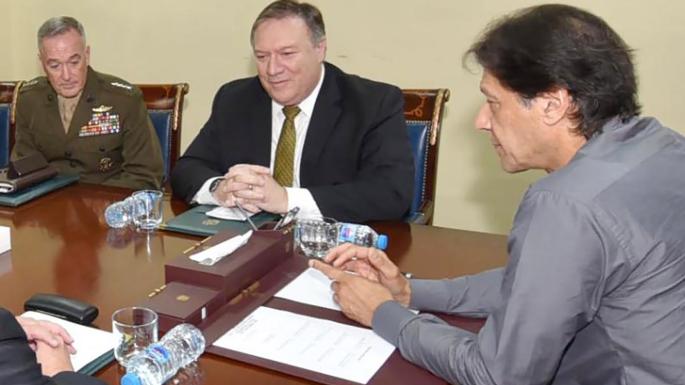While there is gung-ho in New Delhi’s diplomatic circle on deepening of Indo-US ties, China’s thrust in Pakistan-Afghanistan region seems to have compelled the US administration to re-orient American strategy in the region. It could be very much seen in the US efforts to reset its ties with Pakistan which witnessed a sharp deterioration under the Donald Trump administration to the extent. US Secretary of State’s Michael Pompeo’s visit to Islamabad on September 5 and holding talks with newly elected Pakistan Prime Minister Imran Khan and Foreign Minister Shah Mehmood Qureshi indicated clearly that there is intent on both sides to bring their relations back on the track. The US Secretary of State also assured Pakistan of restoring anti-terror aid to it.
Even though it will take time to turn such promises into reality, the development has two immediate geo-political ramifications. First, it shows that the US wants to stay put in Afghanistan and doesn’t want to withdraw its forces from the land locked nation so soon; second, it hints about the Trump administration’s objective to checkmate China in its design to increase area of influence in South Asia and the Indian Ocean.
A major ripple was created in the strategic community of the world when The South China Morning Post, a Hong Kong-based English daily which is owned by Alibaba group, in its August 29 edition reported that China may be building military base in Wakhan, a narrow strip of Afghan province’s Badakhshan which shares boundary with China’s Xinjiang region. The Post reported that the story was based on the disclosure of sources who are close to China’s top military leadership. Beijing, however, denied that it is funding any military base in Afghanistan. But given the past records of China, no one believes in its denials. It had gone on declining that it was reclaiming islands in the South China Sea to build military assets there till it was exposed completely by the international community. It had also denied that it was building its first overseas military base in Djibouti, which got operationalized last year.
In view of these developments, the US doesn’t want to go out of the region where Pakistan serves as an important cog in its strategy in the Indo-Pacific region. What, however, is apprehended by the US administration is that the debt-ridden Pakistan may become China’s client state. As per the State Bank of Pakistan’s statement, Pakistan’s external debt and liabilities stood at a record $91.8 billion till March this year. The SBP further suggested that the figure may touch $100 billion very soon as the country faces challenges on its balance of payment front. China-Pakistan Economic Corridor which passes through Baltistan and other areas of Pakistan occupied Kashmir has added to the burden of Pakistan’s exchequer.
Also Read: Keeping S-400 Russian missiles in mind, India signs COMCASA with US
Till the last week of May, Pakistan was saddled with $10.3 billion in foreign currency reserves. Given this when Imran Khan-led new government was formed, its first and foremost task was to seek bail-out package from the International Monetary Fund. Pakistan has sought $12 billion from the IMF. But the US, the largest contributor of fund to the multilateral funding agency, has put a hurdle in its funding to Pakistan, stating that money meant for development purpose would end up in financing China’s debt due to CPEC project. However, Pakistan has also sought $2 billion loan from China. There is a fear that it will lead to China taking Pakistan further in its octopus grip. Now that US Secretary of State’s visit to Islamabad has rekindled hope in Pakistan and the US of reviving their relationship, it has to be seen whether IMF comes to Pakistan’s rescue or not. But then nothing will be unconditional. Pakistan will have to act on the US’ wish list which includes acting against the Haqqani group, Afghan Taliban and other terror outfits. But the question is: Can Imran Khan-led government which enjoys Pakistan Army’s support on the one hand and fundamentalists, Pakistan Taliban’s support on the other, act as per the US’ wish?
Also Read:
Haqqani Network The World most dreaded Terrorist Network?
Pakistan newly elected president Arif Alvi is son of Jawaharlal Nehru’s dentist
Disclaimer: The opinions expressed in this article are the personal opinions of the author.


















